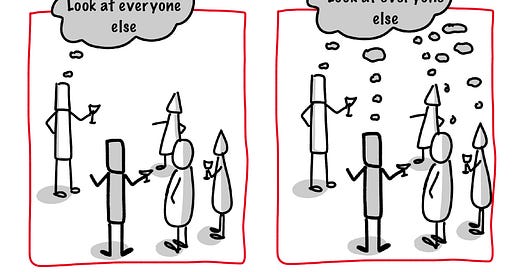What imposter syndrome feels like (and how to overcome it)
Imposter syndrome sucks, here's how to beat it.
Hello again,
This week has been full of ups and downs for me. It’s been great to be with friends and family back home, but travelling and illnesses have brought a lot of stress.
when everything seems to be 10x harder than normal, it makes me wonder why I do anything.
After all, there are people who are far better at drawing, people who can read more or find more unique ideas. Why bother when someone is always better?
That’s kind of the theme in my little visual meditation at the end, drawing upon two things I shared this week on imposter syndrome. But there’s another point I want to make about sketching and sketchnoting.
If you enjoy it and find it valuable, that’s reason enough.
Some people talk about the benefits of remembering more or standing out online (both true) but we don’t always see those results.
But having fun, I always have fun when sketchnoting. It’s not always easy, but fun and easy aren’t enemies.
Anyway, let’s get into some great content from around the web before the meditation.
Interesting links from around the web
Rob Dimeo shared a sketchnote summary of “How Big Things Get Done”.
That’s big things like landing on the moon. Truly massive projects.
Have you heard of the Barnum effect? Well, you will have after reading this sketchnote from Sketchplanations.
Want a new doodling challenge? Try making one of Corine’s puzzle purses.
Okay, let’s get into the main course
Imposter syndrome is less lonely than it feels
If you feel like you don’t belong in a group, you’re not alone.
Around 70% of people feel some form of imposter syndrome in their life. It might not last long, but it strikes the majority of us. Even when we know that we should be someone and can do our job, we can feel intense fear.
While this realisation may help bring some relief, it is unlikely to be enough.
That’s why I took the time to make a sketchnote summary of an in-depth article on imposter syndrome from Nick Wignall. Nick is a clinical psychologist whose newsletter is read by over 50,000 people each week. He’s helped people suffering with regular self-doubt and crippling imposter syndrome and here are his top insights on overcoming it.
My top insights were
There are initial causes and maintenance causes. The second is easier to affect.
“Treat yourself as a good friend”. I’ve used the trick of “What advice would you give a friend” to help me with tricky decisions, but this is a great addition for how to look after yourself.
Practising emotional vulnerability is great if your workplace supports it. So it’s important to create a work environment where we can be vulnerable and admit our doubts and mistakes.
What about you? Are there any points that stand out to you?
If you’d like to find out more, read Nick’s original article for all the details.
One more thing…
Before I go, I want to give you a secret invitation for a sketch30 challenge starting on the first of January, 2024.
Here’s the basics
We create a sketch sharing an idea or quote everyday for 30 days
There are a few optional lessons that will help you represent your ideas
We comment and encourage each other to help motivate us through the challenge.
So by the end of the challenge, you’ve improved your sketching and built a community.
It’s an idea I had a couple of years ago then found someone else was doing something similar so I dropped it. They’ve stopped now so I think it’s the perfect time to try it.
Oh, and it’s free for the first group to help test and shape the material.
It starts in just over a week as long as we get enough signups.
I hope to see you there.
Chris








